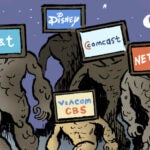Here’s today’s AdExchanger.com news round-up… Want it by email? Sign up here.
If It Ain’t Broke, Don’t Flix It
Public investor Bill Ackman scooped 3.1 million Netflix shares, a 0.68% stake in the company.
The bulk buy by Pershing Square, Ackman’s fund, was inspired by Netflix’s recent stock plunge, reports The Wall Street Journal. Netflix missed Q4 subscriber estimates by a couple of hundred thousand new users – it generated 8.3 million signups, rather than the 8.5 million projected – following a rough couple of months.
Netflix shares reached an all-time high of around $690 in November 2021. They closed at $386.70 on Thursday.
Investors are skittish about Netflix because competition for streaming viewers has increased and particularly because there are now free, ad-supported channels gaining traction.
Capricious Wall Street investors may soon turn back in Netflix’s favor, though. The AVOD narrative has gained strength, but new players haven’t pulled subscribers from Netflix or even narrowed the gap.
Netflix is peering in the rearview mirror as Disney+ and other major broadcast subscription services race to catch up. For now, though, Netflix remains the runaway category leader with 222 million paid subscribers – almost double Disney+’s 118 million accounts. And that number is being generous to Disney+, which has many one-year promotional deals and subscribers via a bundled discount with Hulu or ESPN+.
Peacock, Bear Or Bull
Speaking of Netflix challengers, Comcast will double its production budget for Peacock to $3 billion this year, with plans to reach $5 billion annually in the next year or two, Bloomberg reports.
Peacock could be a case study for bullish Netflix investors. The ad-supported service had 24.5 million users at the end of 2021, but only 9 million are paying accounts, since it has so many promotional offers and comes along with cable cord subscriptions.
Peacock loses money – it was a $2.5 billion loss leader in 2021 – and the increased programming costs will stretch that profitability gap.
But streaming is a long-term priority, so Comcast will eat a multibillion-dollar loss for years. This dynamic demonstrates how even global media and tech titans trail far behind in streaming and can’t easily buy their way in.
At $3 billion this year, Peacock’s programming budget lags Apple TV, Hulu and HBO ($6 billion, $5.5 billion and $4.5 billion, respectively). Top-tier players Disney+, Amazon Prime and Netflix spend $9.5 billion, $12.5 billion and $14 billion per year on content.
When would-be streaming contenders raise prices and stop offering promotional deals, it will be a sign of maturity and strength in the market.
Microsoft’s Island Of Misfits
Microsoft is simultaneously one of the most interesting – and boring – companies in advertising right now.
Microsoft’s ad revenue assets include the likes of MSN (who?), Edge (what?), Outlook.com (yuck) and Bing (lol). Although it does have a few shiny toys, such as Xbox and, as of very recently, Activision Blizzard, it’s unclear how they fit into the advertising picture, beyond Xbox account data being incorporated into the Microsoft Audience Network.
Microsoft’s social platform play is LinkedIn – not exactly YouTube- or TikTok-level cultural cache. But, to be fair, LinkedIn’s ad revenue soared 37% during the most recent quarter, contributing a 21% lift in quarterly profits for Microsoft, Insider reports.
And LinkedIn has scale and strong vertical offerings for B2B marketing (where LinkedIn is the platform). Add to that Microsoft’s retail media chops, with PromoteIQ, and now the former AppNexus ad tech (via the Xandr deal).
Another underappreciated advantage is that, despite being a huge player in search, programmatic, software, hardware, gaming and more, Microsoft doesn’t have the same constraints as other walled garden giants. Google, Facebook or Amazon couldn’t buy Xandr or Activision Blizzard without triggering an anticompetition suit.
Microsoft is likely happy to be thought of as a minor or outdated player. Frankly, they’re laughing all the way to the bank.
But Wait, There’s More!
The FTC fines online retailer Fashion Nova for suppressing negative reviews on its site, a first-of-its-kind violation. [NYT]
The reason why sports streams have advertising gaps, explained. [Marketing Brew]
Complex Collective, the research arm of BuzzFeed-owned Complex, is now a seven-figure revenue stream. [Digiday]
The EU Commission clears Facebook’s purchase of customer service startup Kustomer. [ABC News]
You’re Hired!
Customer experience firm O3 World names Mahesh Gaitonde as its chief digital officer. [release]
Browser Brave welcomes Annie Lee as its first CMO. [release]














